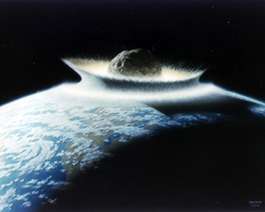Probing Question: Are Asteroids a Threat to Earth?

Hollywood thrillers such as Deep Impact helped to jump-start America's interest in knowing what our "deflection strategy" would be if a giant asteroid was on a potentially catastrophic collision course with Earth.
Chris Palma, senior lecturer in astronomy and astrophysics at Penn State, says that such events are statistically highly probable. "Throughout Earth's history, we have been bombarded by comets and asteroids from space," Palma notes. "Impacts happened more frequently in the past, but they will happen again. It is just a matter of when."
Explains Palma, a law was passed two years ago requiring NASA to "to both survey for near Earth objects and come up with a plan to divert those objects." Yet, some experts have criticized both NASA and the United States government for not doing enough to prevent potential impacts with Earth.
The so-called Tunguska event in 1908, believed to have been the only large-scale meteorite hit within recorded human history, reportedly flattened over 830 square miles of Siberia, with an explosion a thousand times more powerful than the atomic bomb dropped on Hiroshima. While it is staggering to imagine such damage in a heavily populated area, Palma cautions that "we have no experience with these scenarios and can't do more than estimate the number of lives that will be lost and the amount of damage to the infrastructure in the impact region."
Programs have been set into place to help predict and monitor threats posed by meteorite and asteroid impacts, such as NASA's Near Earth Object Program and University of Arizona's SpaceWatch group. However, Palma's impression is that the majority of similarly focused programs are spearheaded by "individual researchers."
What would happen if an asteroid was detected heading toward Earth? A number of different ideas have been proposed, says Palma, including "sending a very massive unmanned spacecraft towards the asteroid and using the ship's gravitational pull to nudge the asteroid off course." Adds Palma, the idea isn't to physically push it, but rather to use the spacecraft's strong gravitational pull to cause the asteroid to move into a different orbit without directly impacting the asteroid."
Would such a dramatic, heroic endeavor succeed? "My guess," says Palma," is that this particular model is a good theoretical starting point, but not one that is necessarily going to be feasible if applied."
Is enough being done to prepare for potential threats? As with so much else, it all depends on who you ask, though all agree that the stakes are high. After all, the most popular explanation for dinosaur extinction is the widespread after-effects of a giant asteroid impact.
Regarding our current state of deflection readiness, Palma says, "I think it is a bit of a stretch to say that NASA is doing nothing about this, but at the same time, I think you can argue that they should be doing more."
Source: by Josh Ambrose, Research Penn State





















